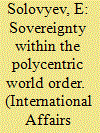| Srl | Item |
| 1 |
ID:
143727


|
|
|
|
|
| Summary/Abstract |
IN 1992, FRANCIS FUKUYAMA brought "the good news" of the end of history: Liberal democracy had won, putting an end to the "history of conflicts" between states. Classical bipolarity had become a thing of the past. The Cold War ended in the "complete triumph" of the West (Western interpretation) to be replaced with tectonic shifts in the system of international relations. Politicians and experts spoke about the Soviet Union's disintegration as the end of history of ideological conflicts and a logical death of geopolitics, a product of the imperfect balance of power of the New Times that developed into the bipolarity of the Cold War to arrive at the consolidated, stable and manageable unipolar world - the "new world order." In this context, "the end of history" looks logical. Liberal norms and institutes as well as problems of economic development have moved into the place previously occupied by geopolitics and political realism concerned with the balance of power, problems of security and structural factors. Diplomats discarded the no longer needed security issues to concentrate at trade and climate change; the United States tempted by the idea of the end of geopolitics appreciated the possibility to minimize the maintenance costs of the world order and enjoy the advantages of globalization and open world markers. The Europeans, likewise, profited from the new unipolar world order. They used the chance to expand to the East and spread their soft power and influence on a global scale.
|
|
|
|
|
|
|
|
|
|
|
|
|
|
|
|
| 2 |
ID:
137315


|
|
|
|
|
| Summary/Abstract |
THROUGHOUT the last three decades, the system of international relations has changed beyond recognition. Classical bipolarity has become a fact of history while the world has become aware of paradoxes of globalization and transformation of world politics. On the one hand, the human community has become an indivisible and interconnected whole. Globalization suggests cooperation in the face of common problems; adoption of common norms and rules of conduct in world politics; improvement of the old and creation of new efficient international institutions. On the other hand, globalization, responsible for the uneven development pace and emergence of a vanguard group of states and transnational forces (including the TNCs) which enjoys all the advantages offered by globalization, exacerbates a wide range of problems and causes grave economic and political crises and social upheavals.
|
|
|
|
|
|
|
|
|
|
|
|
|
|
|
|
| 3 |
ID:
157254


|
|
|
|
|
| Summary/Abstract |
ELECTION OF DONALD TRUMP and his active efforts to undermine the foreign and domestic policy course inherited from the Obama administration sent waves of concern across the Western analytical community. His inaugural address had a bombshell effect on Western mainstream media. His close to perfect populist speech (calling "to drain the Washington swamp" and "give power back to the people") was nationalist at the brink of "isolationism."1 He looked like a perfect right-wing populist and no exception to the common rule: clearly defined problems and real and urgent questions never supplied with clear (or rational) answers.
|
|
|
|
|
|
|
|
|
|
|
|
|
|
|
|